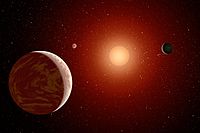habitability of red dwarf systems

Okay, so imagine you live in a really big castle in the sky, but instead of it being a castle, it's a star. Now, stars are basically huge balls of gas and they're really hot, so you can't actually live on them. But there are some stars that are smaller than others, and they're called red dwarfs.
Red dwarfs are like the little brothers of big stars, but they still have their own planets orbiting around them, just like how the Earth orbits around the big star we call the Sun. These planets are called exoplanets, and scientists study them to see if they're habitable.
Habitable means that a planet has the right conditions for life to exist on it, just like how we need oxygen and water to survive. Now, red dwarfs are interesting because they're smaller and cooler than other stars. This means that their habitable zones, which are the areas around a star where temperatures are just right for liquid water to exist on a planet's surface, are closer in.
This might sound confusing, so let me give you an example. If you imagine a red dwarf as a light bulb, then the habitable zone would be like the area around the bulb where it's not too hot or too cold. But because the red dwarf is smaller, the habitable zone is closer to the light bulb than it is to a bigger, hotter star.
So, if a planet is in the right spot in the habitable zone around a red dwarf, and it has the right conditions like water and oxygen, then it could potentially support life. However, there are some challenges to living on a planet orbiting a red dwarf.
For one thing, red dwarfs can be really active and have a lot of flares and radiation, which could be harmful to life on the planet's surface. Also, because the habitable zone is closer in, planets in this zone might become tidally locked, which means that one side of the planet always faces the star and is always hot, while the other side always faces away and is always cold.
Despite these challenges, scientists are still studying red dwarf systems to see if they might be able to support life. Who knows, maybe one day we'll find a planet orbiting a red dwarf that's just right for life to exist on it!
Red dwarfs are like the little brothers of big stars, but they still have their own planets orbiting around them, just like how the Earth orbits around the big star we call the Sun. These planets are called exoplanets, and scientists study them to see if they're habitable.
Habitable means that a planet has the right conditions for life to exist on it, just like how we need oxygen and water to survive. Now, red dwarfs are interesting because they're smaller and cooler than other stars. This means that their habitable zones, which are the areas around a star where temperatures are just right for liquid water to exist on a planet's surface, are closer in.
This might sound confusing, so let me give you an example. If you imagine a red dwarf as a light bulb, then the habitable zone would be like the area around the bulb where it's not too hot or too cold. But because the red dwarf is smaller, the habitable zone is closer to the light bulb than it is to a bigger, hotter star.
So, if a planet is in the right spot in the habitable zone around a red dwarf, and it has the right conditions like water and oxygen, then it could potentially support life. However, there are some challenges to living on a planet orbiting a red dwarf.
For one thing, red dwarfs can be really active and have a lot of flares and radiation, which could be harmful to life on the planet's surface. Also, because the habitable zone is closer in, planets in this zone might become tidally locked, which means that one side of the planet always faces the star and is always hot, while the other side always faces away and is always cold.
Despite these challenges, scientists are still studying red dwarf systems to see if they might be able to support life. Who knows, maybe one day we'll find a planet orbiting a red dwarf that's just right for life to exist on it!
Related topics others have asked about:
Acaryochloris marina,
Astrobiology,
Circumstellar habitable zone,
Gliese 581g,
Habitability of F-type main-sequence star systems,
Habitability of K-type main-sequence star systems,
Habitability of neutron star systems,
Habitability of yellow dwarf systems,
Kepler-186f,
Planetary habitability,
Search for extraterrestrial intelligence
